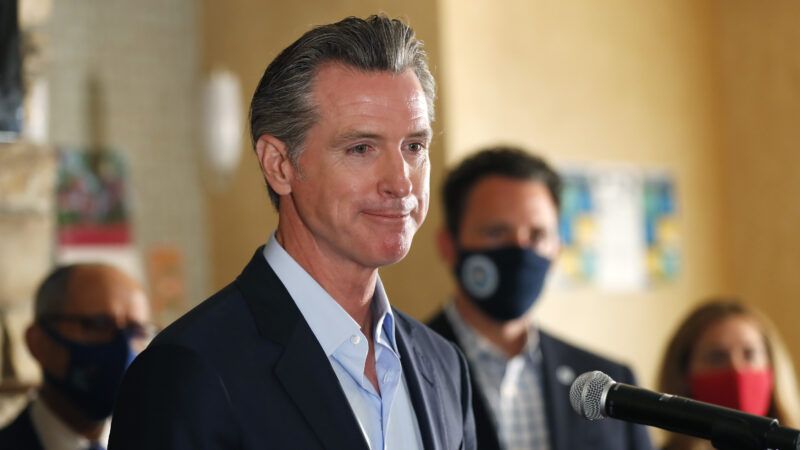Are Gavin Newsom's $600 Checks a Redistributive Vote-Buying Scheme or Welcome Return of Stolen Goods?
California's embattled governor wants to spend $8 billion of the state's surprise budget surplus on individual payments to state residents.

Flush with a surprise budget surplus and facing an impending recall election, California Gov. Gavin Newsom is engaging in a little populist politicking by proposing to send checks straight to state residents.
Those checks will come as part of the Democrat's $100 billion "California Comeback Plan," made possible by a staggering $75.7 billion in excess state revenues and an additional $25 billion in federal coronavirus aid. (The proposal will still have to be approved by the state legislature.)
The details of how all that money will be spent "will be trickled out by Newsom's team, hoping for a crescendo of budget news to build throughout the week and culminate with the unveiling of the governor's revised state spending plan" on Friday, reports the Los Angeles Times.
The governor was nevertheless eager to telegraph the checks when he announced the state's huge budget surplus on Monday.
"We are tripling the Golden State Stimulus to get money in the hands of more middle-class Californians who have been hit hard by this pandemic," said Newsom in a Monday press release. "Two in three Californians will receive a check from the state."
Earlier this year, California sent $600 checks to low-income Californians earning up to $30,000, low- and middle-income undocumented workers, the disabled, and families already receiving state CalWORKS benefits. (Low-income undocumented workers qualified for an additional $600 to make up for their exclusion from federal relief payments.)
This second round of checks is more broad-based. It will give all Californians earning up to $75,000 a $600 stimulus payment. Families with children will get an additional $500.
Perhaps as intended, the checks are forcing Newsom's Republican opponents—including contenders in the upcoming recall election—to perform some awkward political contortions as they try to criticize the governor without coming out against free money.
"One-time payments for just one year isn't enough, not nearly enough," former San Diego mayor and current gubernatorial contender Kevin Faulconer said to the Associated Press. "We need permanent, lasting tax relief for middle-class families." Businessman and bear enthusiast John Cox, who is also running in the recall election, dismissed the checks as vote buying at a campaign event.
Ironically, these checks are likely mandated by a decades-old ballot initiative passed by anti-tax activists trying to limit government largesse. That initiative, 1979's Proposition 4, uses a complicated formula that incorporates population growth and inflation to cap the allowable amount of government spending.
When revenues exceed that cap—the"Gann limit," named for Proposition 4 champion Paul Gann—the extra money has to be returned to taxpayers. Subsequent amendments to the law require half of excess revenues to be given to public schools.
The limit has only been triggered once before, in 1987, when $1.1 billion was given back to taxpayers.
It takes two years to calculate precisely how much of a budget surplus has to be returned to taxpayers. But Newsom is wasting no time in getting this money out the door. His staff is insisting that the checks satisfy the Gann Limit's requirements.
The estimated amount of money that the state has to surrender under Proposition 4 is $16 billion, half of which will fund this second round of stimulus checks. The other $8 billion will go to education.
So what's a libertarian to make of these stimulus checks?
One could argue that this is just the state returning money it took from taxpayers. The trouble with this argument is that the reason California has Gann Limit–triggering surplus revenues to begin with is its steeply progressive system of taxation.
State revenues depend heavily on income taxes levied on high earners, and on state capital gains taxes. The highly paid professionals and the owners of capital who pay those taxes have done quite well for themselves during the pandemic, with much of their good fortune filling the state's overflowing coffers. Newsom's stimulus checks therefore take a surplus funded largely by high-income earners and redistribute it to low- and middle-income Californians.
To be sure, putting money in individuals' pockets to spend as they see fit still seems a better use of excess government revenues than lavishing it on state bureaucracies. The governor himself has made that point. "We believe people are better suited than we are to make determinations for themselves on how best to use these dollars," he said while announcing the plan, striking a rare libertarian note.
And if it helps him beat the recall too, I'm sure he won't mind.
Rent Free is a weekly newsletter from Christian Britschgi on urbanism and the fight for less regulation, more housing, more property rights, and more freedom in America's cities.


Show Comments (47)